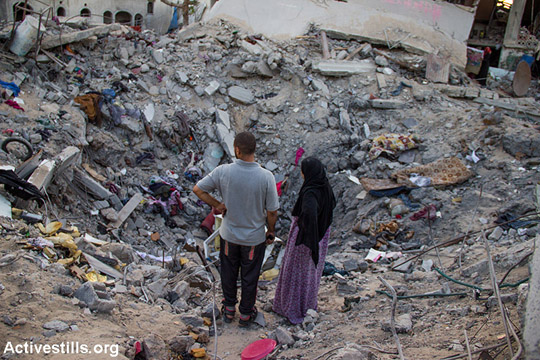Gaza-based ‘Media Town’ claims Benny Gantz, who many see as Netanyahu’s only credible opponent in the upcoming elections, cribbed aerial footage of destroyed neighborhoods in Gaza following Operation Protective Edge.
A Palestinian media company is claiming that former Israeli army chief and aspiring politician Benny Gantz stole their footage for a campaign video boasting of the death and destruction he wrought on Gaza in the 2014 war.
Israeli social media lit up last week after Gantz, who many view as the top contender to unseat Prime Minister Benjamin Netanyahu in the upcoming elections, published a number of highly controversial campaign videos on his Facebook page.
Between 2,125 and 2,310 Gazans were killed and over 10,600 were wounded — including 3,300 children — during Operation Protective Edge. According to UN estimates, more than 7,000 homes were destroyed, while another 89,000 homes sustained damage. Rebuilding costs were calculated to run from $4-6 billion over the span of 20 years.
“Media Town,” a Gaza-based Palestinian media company, is claiming Gantz used its footage for his election campaign without permission. The company published a post on Facebook accusing Gantz of stealing their footage and publishing it on his social media accounts. Media Town further claimed they were the only company to have flown a drone over Gaza during the war.

“It is difficult to see a video in which Gantz takes pride in destruction and killing,” said Ashraf Mashrawi in a phone call. “It has nothing to do with where I am from, it has to do with basic humanity. A moral person must want to build and create life, not the opposite.”
Mashrawi, who lives in Gaza, films videos in conflict zones the world, including in Turkey, Libya, Yemen, and Syria. “Our footage has been stolen before, but this is the first time that a political campaign has taken our footage without permission,” he says. “It’s not nice when your work is stolen, it’s copyright infringement. Anyone who respects other people’s labor must first ask us for permission.”
Media Town sent the original footage, which was first published by the BBC in 2014, to Local Call for verification.

Mashrawi says that Media Town works with many international outlets, but always under limited licensing, which forbids outlets from selling the footage to third parties. “Try to ask the BBC to buy the same video, they will immediately send you to us,” he said. “According to our agreement, they cannot sell the material or even use it in a different story without speaking to us.”
Asked to comment, spokespeople for Gantz’s newly-founded Israel Resilience Party initially said they were not aware of Media Town’s claims. They later chose not to respond, yet never said they purchased the video footage.
“We responded on their YouTube channel and said it is our material,” said Mashrawi. “If they are professionals, why did they stop looking into our complaint?” Mashrawi said he also demanded YouTube remove the video but has yet to receive a response from the company. “Usually they take down the video within a few hours, but it has been two days and they have still not answered us.”
This article was first published in Hebrew on Local Call. Read it here.

